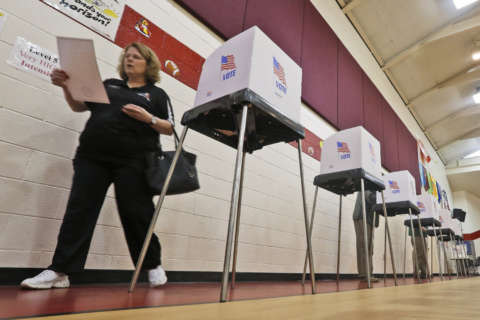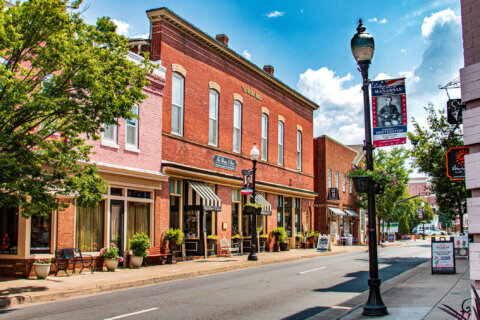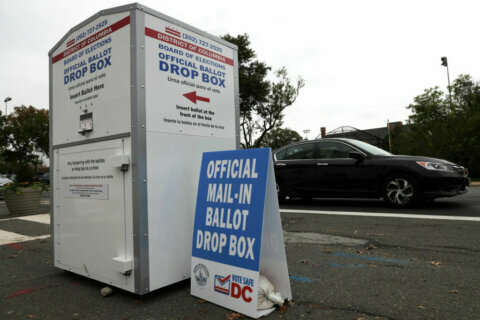Editor’s note: This is one in a series of pieces on the Nov. 6 midterm election. WTOP interviewed candidates in key contested local races. See all of WTOP’s coverage election coverage.
WASHINGTON — The lone non-Democrat on the Arlington County Board is facing a tough re-election fight on Nov. 6.
John Vihstadt was elected to the county board as an independent in a 2014 race that focused significantly on his opposition to the county’s planned streetcar system, which was then scrapped.
“I have successfully steered the board in, I believe, a more responsible fiscal position in terms of moving away from extravagant and, frankly, unessential projects — things like the streetcar, the million-dollar bus stop, a $1.6 million dog park, a museum which was a white elephant from the day it opened — and I’m hoping that we’re not going to be funding a gondola that connects Rosslyn to Georgetown either,” Vihstadt said in an interview.
The Long Bridge Park aquatics center has also been cut back, but is now due to open in 2021.
Democratic nominee Matt de Ferranti said his top priority is cutting down on Arlington’s office vacancy rate, which has been stuck around 20 percent, and bringing in more tax revenue from businesses.
“Yes, fiscal responsibility, but we can’t cut our way to prosperity, and we have to make smart investments, like undergrounding the Orange Line was in 1968, so that we can grow as a whole community,” de Ferranti said.
“[Voters] want to know who’s going to be the best choice for the next four years. Who’s going to address the office vacancy rate, the school capacity crunch, and who’s going to act on climate change — I propose 100 percent renewable energy by 2035 — who’s going to act on the issues they care about. So, predominantly it’s a local election and it should be, but values and ideals matter, and I think I bring those ideals that are consistent with Arlington’s history to our biggest challenges over the next four years,” de Ferranti added.
In a second full four-year term, Vihstadt said he would focus on more than just his record of trying to cut or get smarter spending.
“Number one, growing our economy, but also managing that growth; number two, greater openness, transparency and inclusion in the way the county does its business; and finally, a stronger sense of fiscal discipline with cost and value being a part of every conversation,” Vihstadt said.
The Arlington County Board has staggered terms. Each of the seats is elected at-large by all voters in the county.
‘Managing growth’
By managing growth, Vihstadt said he means harnessing it. “Just as I say that we’re not Mayberry RFD, I don’t think that people envision Arlington to become a Manhattan on the Potomac either,” he said.
“We need to have a better understanding of the costs and consequences of that growth,” Vihstadt said.
He is focused on cost-benefit reviews of any new development.
“We know that development brings in tax revenue, and that’s important because the more commercial development we have, the less of a strain on our residential property tax base there will be … but that also there are costs and consequences to development: What’s the impact on our schools, our green space, our tree canopy, our infrastructure, our community centers, our libraries, our fire stations and so forth,” Vihstadt said.
For de Ferranti, he sees a focus on bringing in businesses, particularly in potential future growth industries such as cybersecurity, green technology or energy, medical technology and education, as critical to Arlington’s future.
“Arlington’s a great place to live, but if we don’t grow our economy, the things that have made us such a great place to live — like excellent schools, affordable homeownership and affordable housing, and our inclusive values, our focus on renewable energy and the environment — all of those things won’t be affordable if we don’t grow our economy by bringing down our office vacancy rate,” he said.
As a county board member, de Ferranti said he would focus on marketing and growing businesses inside Arlington and attracting others, and trying to keep Arlington on the leading edge of Wi-Fi technology.
Vihstadt said he is also interested in addressing Arlington’s office vacancy rate, and there have been some positives, such as Nestlé’s move to Rosslyn, but he acknowledged the county has a more difficult task, with Tysons and D.C. getting more attractive to some companies.
“We need a regulatory and permitting process that is responsive; we need a zoning and land use process that is nimble enough to adapt to changing conditions, and we need to be anticipatory of new trends in the marketplace and adaptable,” Vihstadt said.
Maintaining any type of affordable housing in Arlington will take creativity though, de Ferranti said, citing ideas such as co-ops or community trusts.
“We’ll also need to be committed and courageous and relentless in our budgets in making sure that the middle class can afford to buy. It’s not a problem that I can fix overnight, and it’s not a problem that we as a community can fix overnight, but you do want to know that the person that you choose is working relentlessly and creatively to find land use and co-op type approaches and other approaches to make Arlington affordable for the middle class,” de Ferranti said.
“My opponent takes refuge in gauzy platitudes and big ideas but not much in the way to back them up,” Vihstadt shot back.
Schools
Both candidates agree that the costs of school construction should be a focus, as the county tries to address a capacity crunch and the divide between different parts of the county.
“As far as building those additional seats, the additional school capacity, we need to bring down our cost per seat. The most important factor in educating a child is the quality of their teacher, so we need good buildings, but we don’t need gold-plated buildings, and bringing down that cost per seat will enable us to build the seats we need while also keeping our budget in check,” de Ferranti said.
Vihstadt, a former president of the Yorktown PTA, said more money is needed for school capacity, and a streamlined school permitting process could help.
“We also need to look at other ways to help fund our schools,” Vihstadt said.
He would be open to changing how much the county contributes to the school system.
“We already allocate roughly 46 percent of our general fund money to the schools, even though less than 20 percent of all Arlington households have schoolkids. But notwithstanding that, we know that even for folks who don’t have kids or who never had kids, schools are important because schools not only give us a competitive edge in an increasingly competitive economic environment, but they also provide for the job market — because employers want to locate in a locality where they have a strong workforce, and schools, after all, keep property values up,” Vihstadt said.
To de Ferranti, filling empty office space could provide the county with the money needed.
“Investing and growing our economy to bring businesses and grow businesses here is really the medium- and long-term way out of this budget challenge that we face,” he said.
He called for “a commitment and willingness to invest in our future. We need to invest to address our school capacity challenge, and, last year, there was a choice as to whether to even advertise or consider just a half-cent of a property tax increase. I think we didn’t have as good a dialogue last year, and now we’re facing a $78 million deficit.”
He would also like to focus on ending child hunger in Arlington.
“We should set goals on equity and fairness with respect to our neighbors in need that lift the entire community up and address the equity issues that have resulted from an imbalance historically in resources and investment in the county,” de Ferranti said.
Transportation
Both candidates agree Metro is fundamental to Arlington, but de Ferranti has significant concerns about how money was shifted by the General Assembly in Richmond out of money that had gone to local transportation needs.
“We need additional resources to make sure that Arlington’s transportation system works well,” de Ferranti said. “It’s one of those key infrastructure components that is central to our economy thriving and, really, our community having a high quality of life.”
If that money is restored, he said, it could go toward roads, Metro entrances, bike lanes or ART bus service.
Trump effect?
Vihstadt hopes to stay afloat in a year where the catchphrase is “blue wave.”
Candidates for local offices in Virginia are not identified by party on the ballot.
“I am a true independent; I do not consider myself a member of any party. I have embraced my independence in every sense of the word,” he said.
Arlington Republicans and Greens supported him in the 2014 race.
“I think … partisan politics that might have more saliency at the federal level and the state level don’t have that same degree of relevance at the local level,” Vihstadt said.
“People want balance; they want perspective; they want the extra conversation that I have brought as a result of being the lone independent. People think balance is better, and I am confident that at the end of the day on Nov. 6, a majority of people will agree with me, and I’m keeping my purple tugboat atop the blue wave,” Vihstadt said.
For de Ferranti, he sees the race as mostly about local issues, but said a potential surge in Democratic turnout is relevant. “I believe we’ll win; it will be close,” he said.







